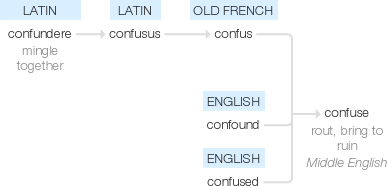Confused
Middle English (in the sense ‘rout, bring to ruin’): from Old French confus, from Latin confusus, past participle of confundere ‘mingle together’ (see confound). Originally all senses of the verb were passive, and therefore appeared only as the past participle confused ; the active voice occurred rarely until the 19th century when it began to replace confound .
etymonline
confused (adj.)
early 14c., "discomfited, routed, defeated" (of groups), serving at first as an alternative past participle of confound, as Latin confusus was the past participle of confundere "to pour together, mix, mingle; to join together;" hence, figuratively, "to throw into disorder; to trouble, disturb, upset."
The Latin past participle also was used as an adjective, with reference to mental states, "troubled, embarrassed," and this passed into Old French as confus "dejected, downcast, undone, defeated, discomfited in mind or feeling," which passed to Middle English as confus (14c.; for example Chaucer's "I am so confus, that I may not seye"), which then was assimilated to the English past-participle pattern by addition of -ed. By mid-16c., the word evolved a back-formed verb in confuse. Few English etymologies are more confusing.
Of individuals, "discomfited in mind, perplexed," from mid-14c.; in logic, "indistinct, indistinguishable from other ideas from which it ought to be different," 1610s. Meaning "lacking orderly arrangement of parts" is from 1776. Related: Confusedly.
